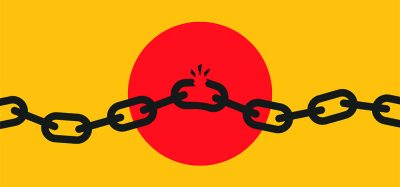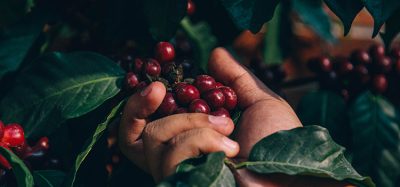Thai Union on sustainable fishing
- Like
- Digg
- Del
- Tumblr
- VKontakte
- Buffer
- Love This
- Odnoklassniki
- Meneame
- Blogger
- Amazon
- Yahoo Mail
- Gmail
- AOL
- Newsvine
- HackerNews
- Evernote
- MySpace
- Mail.ru
- Viadeo
- Line
- Comments
- Yummly
- SMS
- Viber
- Telegram
- Subscribe
- Skype
- Facebook Messenger
- Kakao
- LiveJournal
- Yammer
- Edgar
- Fintel
- Mix
- Instapaper
- Copy Link
Posted: 16 November 2022 | Bethan Grylls (New Food) | No comments yet
With multiple threats looming over our fishing industry, from IUU fishing and climate change, Bethan Grylls interviews Adam Brennan, Thai Union’s Group Director for Sustainability, on what the company is doing to ensure responsibly sourced produce.
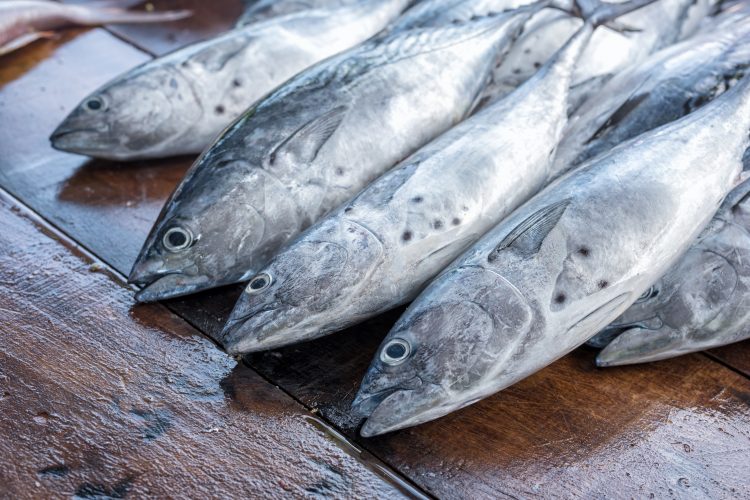

Illegal, unreported and unregulated (commonly referred to as IUU) fishing is still one of the biggest threats to marine ecosystems. It concerns every stage of the supply chain, from the capture to utilisation, and can sometimes be associated with organised crime, such as human trafficking.
It is defined broadly by the Food and Agriculture Organization (FAO) of the United Nations as fishing (and related activities) which are in breach of national, regional and international laws; non-, under- and misreporting of information on operations; using “Stateless” vessels; and fishing in prohibited areas.
IUU fishing is a problem because it can remove the resources available to legitimate fishers, potentially leading to the collapse of local fisheries. It threatens livelihoods and worsens poverty and food insecurity. In fact, it’s estimated that IUU fishing makes up about 11-19 percent of global fisheries production, costing the sector $10-23.5 billion annually.
According to Qu Dongyu, FAO Director-General, “rising consumer demand and transforming agrifood systems in fisheries and aquaculture have driven global fish production to its highest levels”. As with any popular market, unscrupulous activity naturally follows. Fortunately, with this growth, has also come the wide recognition of IUU fishing and the need to address it.
How Thai Union is tackling IUU fishing
There are several big players working hard to combat IUU fishing, and one such industry player that joined the fight, is global seafood leader Thai Union, which owns brands such as Marvo, John West and Genova.
Thai Union has established a range of partnerships to help improve both transparency and sustainability within seafood – a particularly important aspect considering the complexity of the seafood industry.
Additionally, as Thai Union doesn’t own any vessels itself, making meaningful change involves not just assessing its own operations but that of its whole supply chain. And this is where its SeaChange sustainability strategy comes in.
The SeaChange commitment
Eliminating IUU fishing is one of the original goals factored into Thai Union’s SeaChange commitment when it was first established in 2016 – a sustainability strategy from the brand that covers every aspect of the seafood business. Adam Brennan, Thai Union’s Group Director for Sustainability, described it as an initiative that addresses both “above and below water” concerns, such as marine life, waste and fishing community welfare.
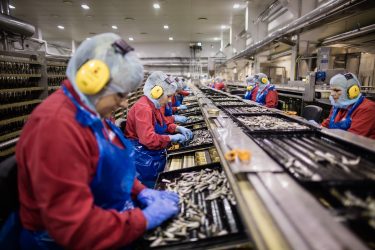

Thai Union’s King Oscar production line
The meaning of sustainability has certainly evolved over the last few years and it’s reasonable to say that responsible practice doesn’t just mean being environmentally friendly but also a viable, fair business. This was something Brennan also acknowledged, “the definition of sustainability is ever evolving,” and is an aspect which SeaChange considered.
The sustainable strategy is an integrated plan of several initiatives organised into four programmes: safe and legal labour, responsible sourcing, responsible operations, and people and communities.
The backbone according to Brennan, however, is traceability. As such one of the first actions the seafood giant took to enable further transparency and best practice was to establish a partnership with WWF in 2014. Then, in 2017, it signed an agreement with Greenpeace.
Brennan said these relationships helped Thai Union to define what responsible fishing looks like and identify the ways it could mitigate risk. Over time commitments from around 10 industry and NGO relationships have been “internalised step by step” into Thai Union’s own policies and ambitions. These supported the formation of the goals within its Tuna Commitment (a part of SeaChange).
Responsibly sourced tuna
Tuna is a core product for Thai Union.. While fish accounts for almost 17 percent of global protein consumption, around five million metric tons of tuna, specifically, are caught annually around the world.
To ensure its tuna was being responsibly sourced, a goal was set by the company to have 75 percent of its branded tuna products by 2020 either sourced from suppliers within fishery improvement projects (FIPs) or Marine Stewardship Council (MSC) certified. By 2018, Thai Union had achieved 51 percent, and by its target date, it was sourcing 87 percent of its branded tuna this way.
Last year, the company made an update to its Tuna Commitment, which builds on the success of the last five years. By 2025, Thai Union is aiming for its tuna to be sourced solely from vessels and suppliers that demonstrate Operational Best Practice to prevent IUU fishing and modern slavery.
“We were one of the first in the industry to clearly communicate down to our supply chain what responsible fishing means for Thai Union and what our expectations are of our suppliers to work with us. The Tuna Commitment and our policy clearly sets this out.”
Checking whether vessels appear on IUU blacklists is part of the daily procurement procedure at Thai Union. The company verifies all the vessel references it receives against the official lists from the Regional fisheries management organisations (RFMOs). The RFMOs also share news via email notifying Thai Union if vessels will be placed on the list.
Satellite technology
Technology also plays a key role in the brand’s work to improve traceability. For example, blockchain has been used within the John West tuna supply, with customers able to scan and track the entire journey of that particular can’s contents.
Thai Union has also employed the Ocean Disclosure Project – a platform that enables participating companies to be transparent about the fisheries where their products originate from.
“We want to be extremely transparent in where and how we’re sourcing our products,” Brennan said.
And to increase monitoring of vessels at sea, for those fleets where it is challenging to have a human observer on board, electronic monitoring is increasingly being installed. This is used to monitor the species that are caught and for reporting purposes.
But what is probably the most impressive setup (at least in this humble writer’s opinion) is the brand’s pilot satellite imaging project. Used to generate key data elements within shrimp farming operations, this experiment was pulled together in collaboration with Sea Warden – a satellite data analytics company – and Wholechain – a supply chain traceability company.
The pilot employed machine learning and artificial intelligence in combination with historical production activity from a range of Thai Union’s shrimp farms, to generate reliable data. From there, risk could be assessed and performance monitored across a range of wide geographies – usually a challenging and expensive process.
“You could use this to identify things like shrimp population, a disease outbreak, distance to sensitive nature, or even to estimate on-farm energy use,” Brennan elaborated.
Looking after people and the planet
Worker rights
Part of Thai Union’s sustainable strategy also involves taking care of the communities that supply seafood.
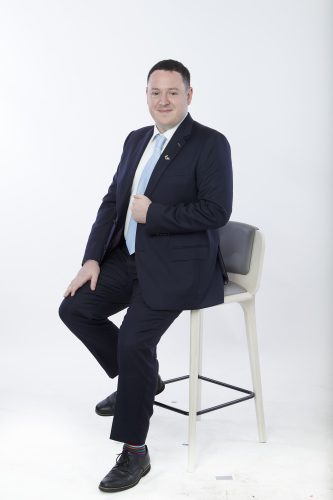

Adam Brennan
“There are hundreds of millions of people employed by the seafood sector, and we need to make sure they’re safe, legally employed and empowered,” Brennan told New Food.
Some of the more recent work Thai Union has been undertaking is with migrant workers – upon which the seafood sector relies heavily.
As mentioned, Thai Union doesn’t catch its own fish, so it’s important that it regularly assesses the workers’ rights and conditions within its supply chain. This is done through Thai Union’s Fisher Work and Welfare Program, which has been completing audits of the vessels globally for tuna and from the vessels that it sources in Thailand against its ‘Vessel Code of Conduct’. In this way, Thai Union reviews its suppliers, and if gaps are spotted, a vessel improvement plan is implemented.
Using its position as a market leader, it is aiming to improve labour conditions throughout the seafood supply chain. By having full traceability of all its seafood products, from catch to consumption, the company hopes to accurately identify gaps in safe and legal labour and give workers a voice.
In Thailand, where Thai Union is headquartered, it has been deploying a “comic contract”. Essentially, these supplement the contracts a migrant worker would need to sign to work in Thailand.
“The Thai labour contract is in Thai and, of course, many of the migrant workers don’t speak or read the language. Together with the most common languages workers speak, the comic contract uses visual and audio to help communicate to the migrant workers what it is they’re signing.”
Climate change
Of course, one couldn’t write a sustainability strategy without addressing climate change.
“We need to tackle the emerging topics too,” Brennan told New Food, referring to the world’s changing conditions. “So, we have recently committed to science-based targets and will be publishing short- and long-term goals early next year, alongside our broader SeaChange 2030 strategy.”
Within this, we can expect Scope 3 targets to be implemented.
“A lot of our emissions lie deep within the supply chain,” Brennan added. So, what does this mean for the brand? “Building more partnerships to create sustainable, scalable interventions that can help to lower the carbon emissions.”
The focus going forwards will be very much on building on its existing work, but Thai Union has also committed to some packaging goals. One hundred percent of its branded packaging will be reusable, recyclable or compostable by 2025, and 30 percent (average) recycled content will be included in its branded packaging by the same date. Moreover, the fish brand is looking at ways to reduce emissions through fuel used on vessels and on-farm energy in aquaculture, including the carbon impact of feed.
The company has already done a lot of work to date on reducing emissions within its operations commitment, but it has also been looking at other, perhaps not so immediately obvious issues.
“Ghost gear,” Brennan stated, “essentially when fishing gear is lost at sea for a number of reasons.”
Indeed, the company has teamed up with the Global Ghost Gear Initiative to investigate why and how gear is lost, drive awareness of the issue and look at ways of preventing it from being lost in the first place.
It’s a timely issue, given the recent plastic-related headlines we’ve been seeing.
Seafood alternatives
Concluding our interview, it seemed apt to ask Brennan his thoughts on the future of seafood.
“There is an urgent need to tackle global food security for a population that is ever increasing,” he remarked. “I don’t think there’s any one single solution. We need to be providing a diverse range of proteins that are able to provide healthy and nutritious proteins without having a significant impact on society and the environment.
“It’s our responsibility to make sure that blue foods have a role to play in that future. But I think also increasingly looking at things like cultured seafood and alternative proteins.”
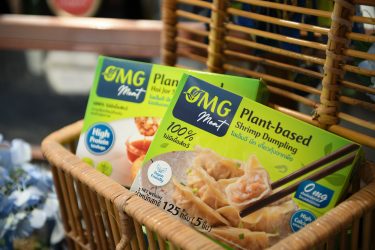

Thai Union’s new plant-based shrimp dumpling
Thai Union has already started to position itself in this area, creating an alternative protein business unit, and with about 40 percent of its consumers saying they want to reduce animal-based foods, it’s a natural move.
“Alternative seafood is expected to grow about 20 percent per year,” continued Brennan. “As we look towards 2025, that’s going to reach up to a market size of $1.2 billion. And we’re looking at what role we have to play in that.”
And Brennan was confident the company would play a significant role.
“We are aiming for about $30 million of revenue from our alternative protein business by 2025.
“Given our experience in seafood, we are well positioned to capitalise on our strong manufacturing capabilities and skills.”
In addition to its recent partnership with ISH Food Company (a plant-based seafood brand), Thai Union has also launched a plant-based shrimp dumpling in Thailand.
“I think one of the most important aspects when we look at sustainability within the seafood sector is not just what it means for Thai Union, but how we use our leverage and partnerships to create long lasting, permanent, scalable change across the rest of the industry. We were able to do that back in 2016 with our original SeaChange commitments and we’re now exploring how to do that again as we look towards 2030.”
The work Thai Union does within sustainability to address issues such as worker rights, IUU fishing and marine life wellbeing is admirable – and the extent to which it covers is far too detailed for this writer’s word count restrictions. I’m looking forward to catching (excuse the pun) up with Brennan in the future to see where progress has been made and if the meaning of sustainability has evolved further.
Related topics
Food Security, Plant based, Recruitment & workforce, Regulation & Legislation, Supply chain, Technology & Innovation, Traceability, Trade & Economy
Related organisations
Food and Agriculture Organization (FAO), Genova, Global Ghost Gear Initiative, Greenpeace, ISH Food Company, John West, Marine Stewardship Council (MSC), Marvo, Ocean Disclosure Project, Sea Warden, Wholechain, WWF



